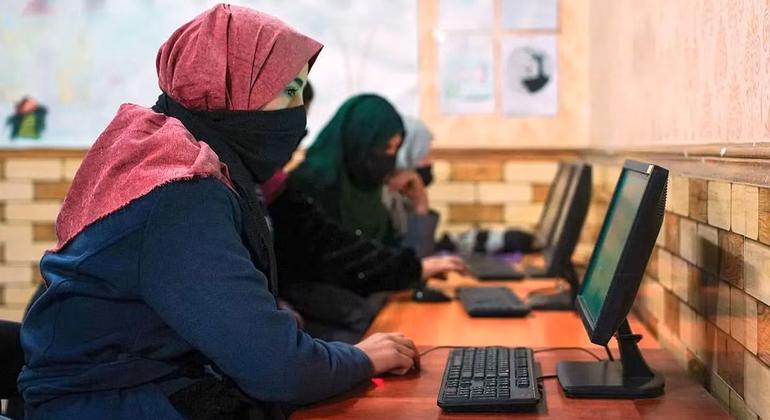At a time when women were already banned from attending schools and universities, Radio Femme has played a crucial role in providing alternative methods of education.
It offers a rare platform for women and girls to learn and continue their studies, with eight teachers delivering lessons in subjects ranging from math to science.
But then on 30 September, with no immediate explanation for the ruling Taliban authorities cut off the internet and phone networks across Afghanistan effectively taking Radio Femme off air.
A UN Women team assesses the earthquake damage in Nurgal, one of the worst affected districts in Kunar province, northeastern Afghanistan. .
The temporary closure of the radio station is just one small example of how women have been affected by the nationwide Internet blackout.
This blackout along with the aftermath of an earthquake in the east of the country, an ongoing drought in the north, and the return of millions of refugees expelled from neighboring countries, has made life for women and girls in Afghanistan increasingly difficult.
“It is another crisis on top of the existing crisis. It is utterly unnecessary for this kind of interruption to take place, and the impact is going to be on the lives of Afghan people.”, said Arafat Jamal, country representative for the UN Refugee Agency (UNHCR).
Why the internet is so vital to women
In an interview with UN Women, women like Sama shared how the internet offers a rare space to work, build small businesses, and sell products.
“Through my online shop, I became well known,” she said. “I’m earning money, solving my financial problems, and becoming self-sufficient.”
Yet, when the blackout struck, Sama lost her only source of income overnight, like many other women. In Afghanistan, the impact of the internet and phone blackouts falls more heavily on women and girls, reported UN Women.
“It eliminates what is, for many, a final means of learning, earning, and connecting”.
While access to the Internet has largely been restored across Afghanistan, the message was clear: this valuable gateway to learning, expression, and services for women and girls can be shut down at any moment–a stark reminder that the digital space is not neutral, according to UN Women.
Women’s education, mental health, and livelihoods are all at stake, the agency said.




